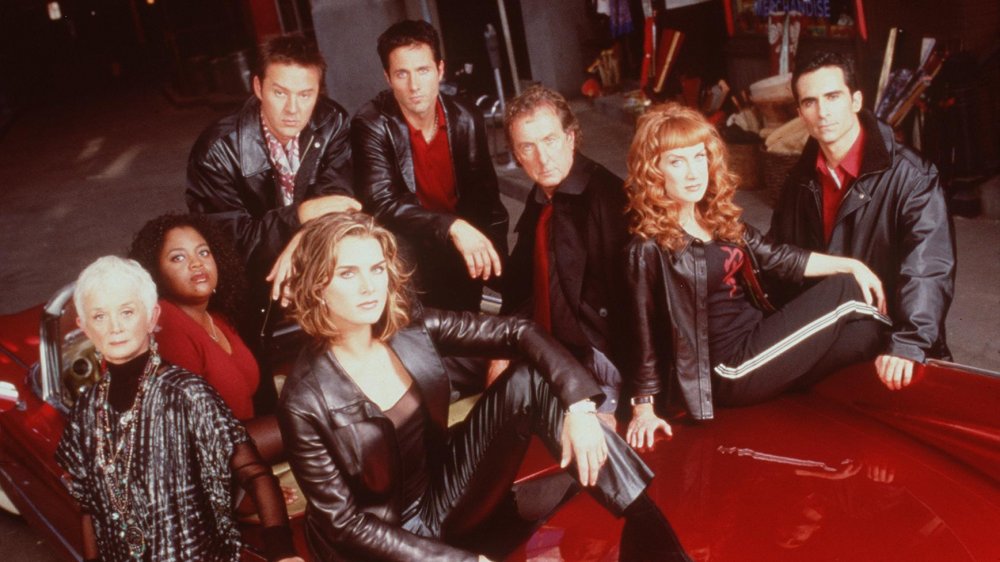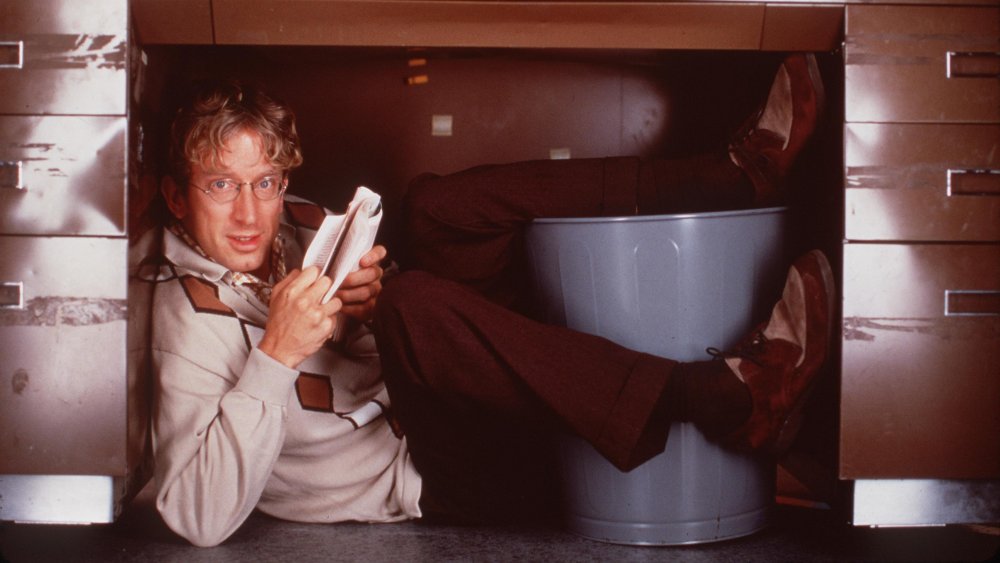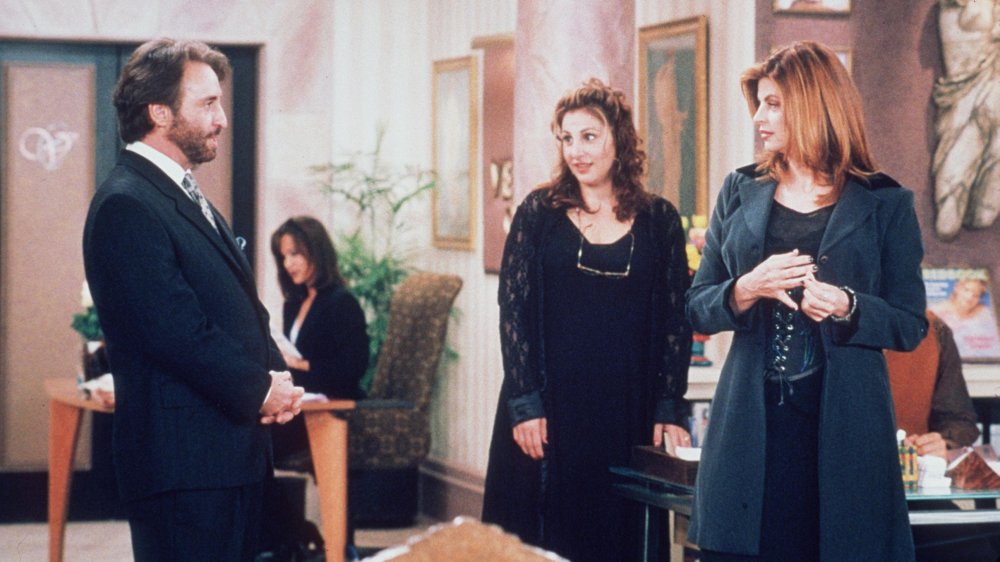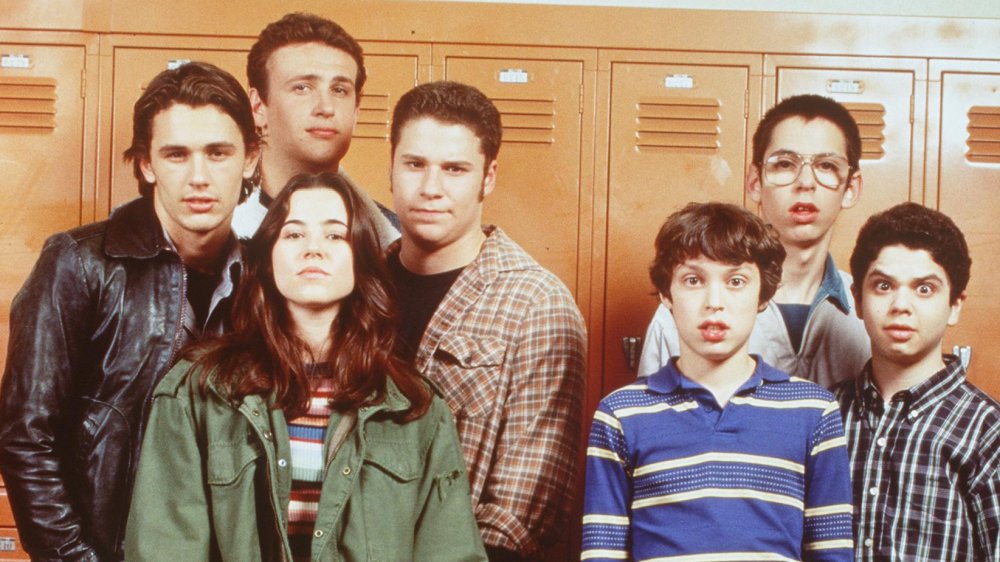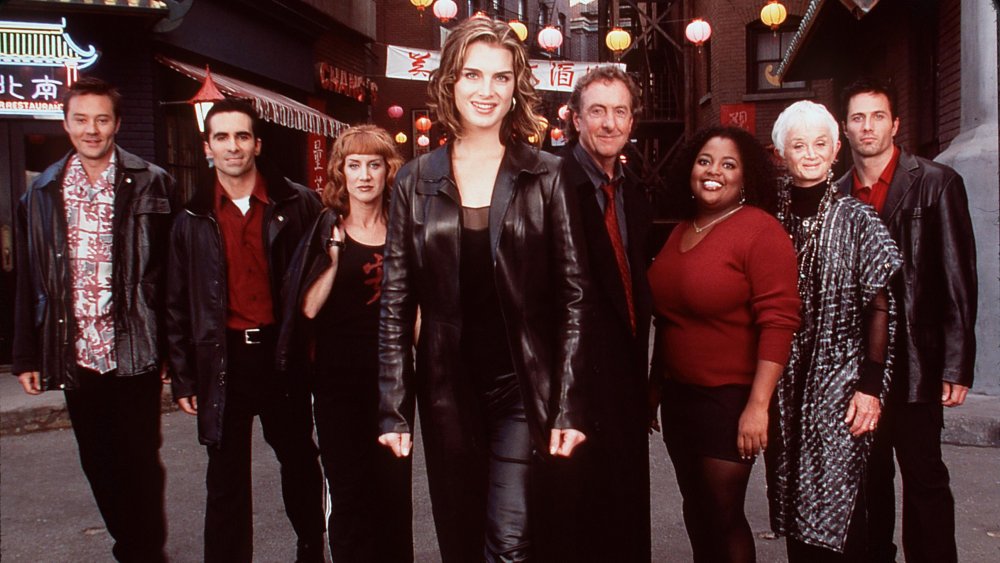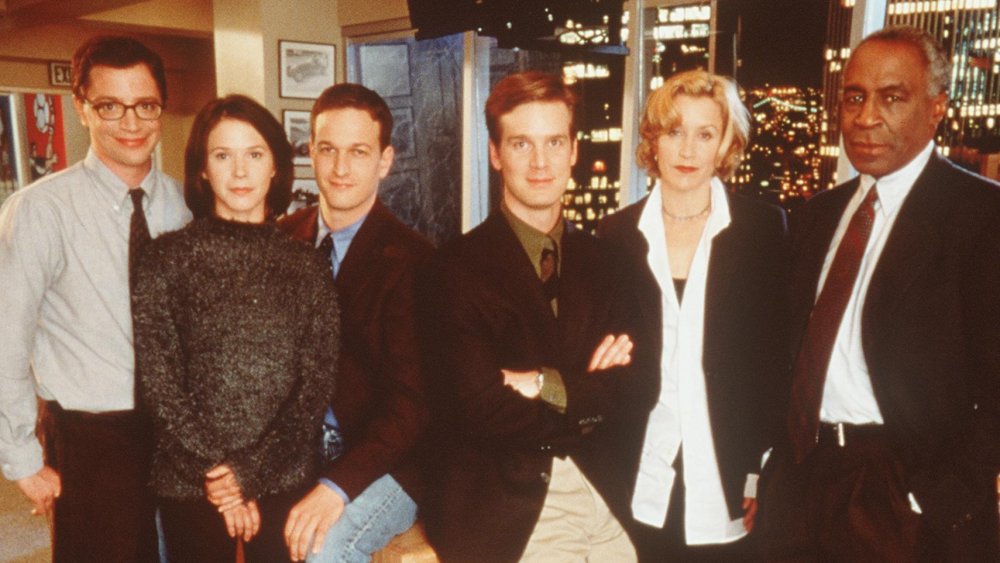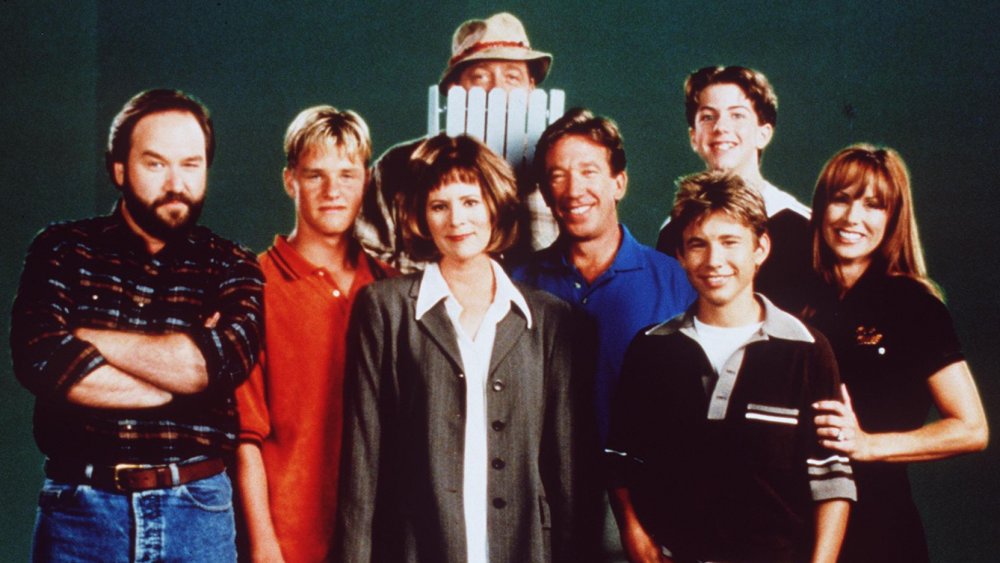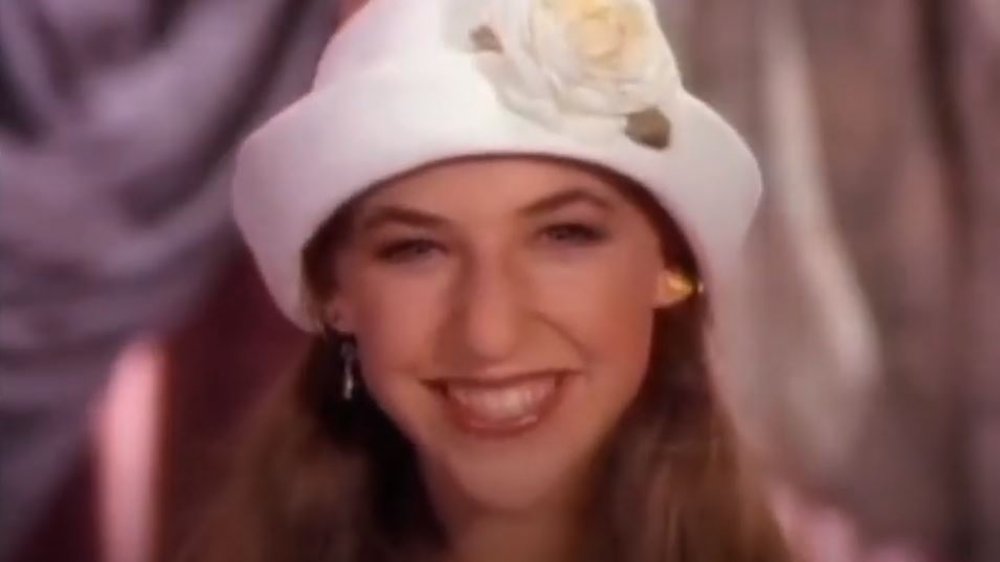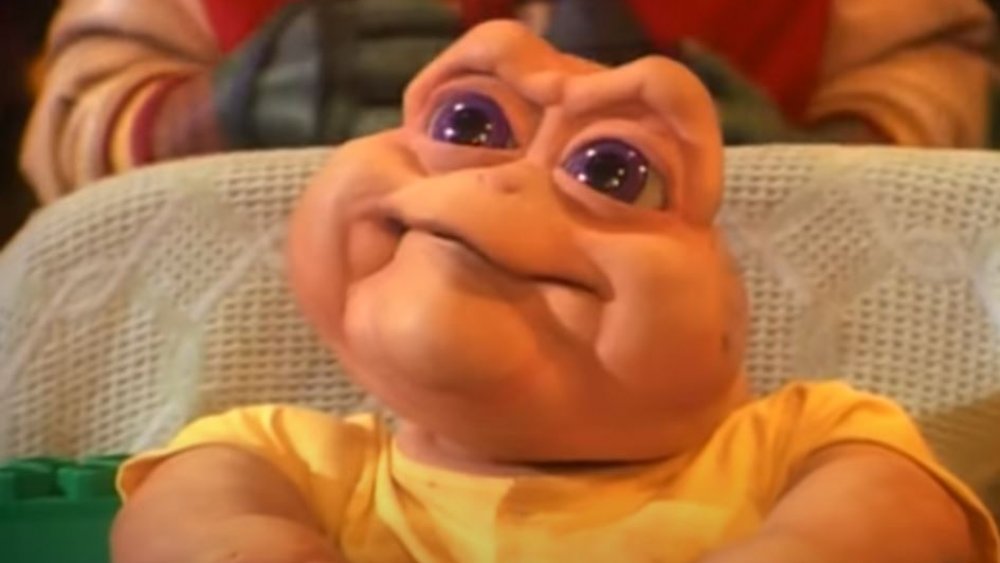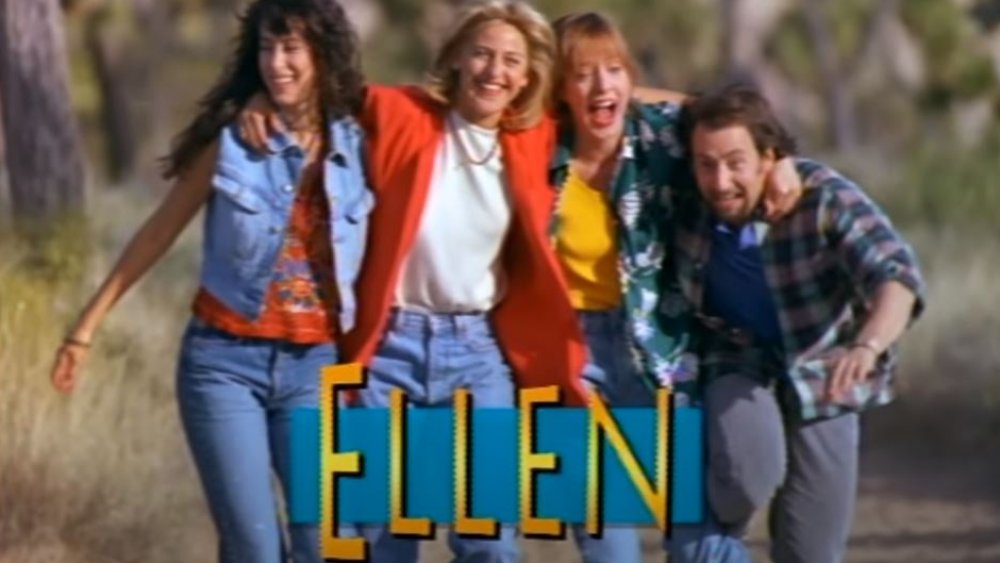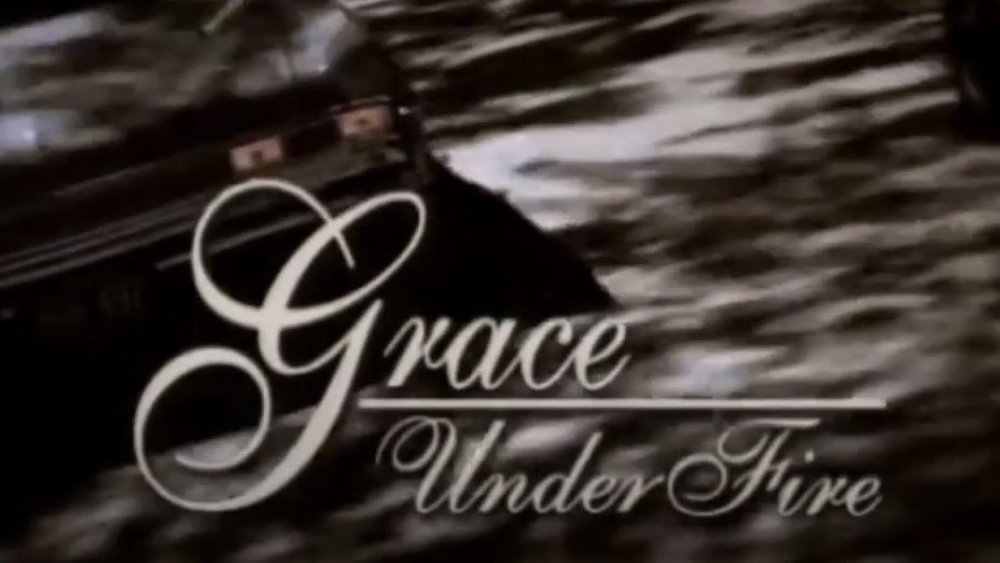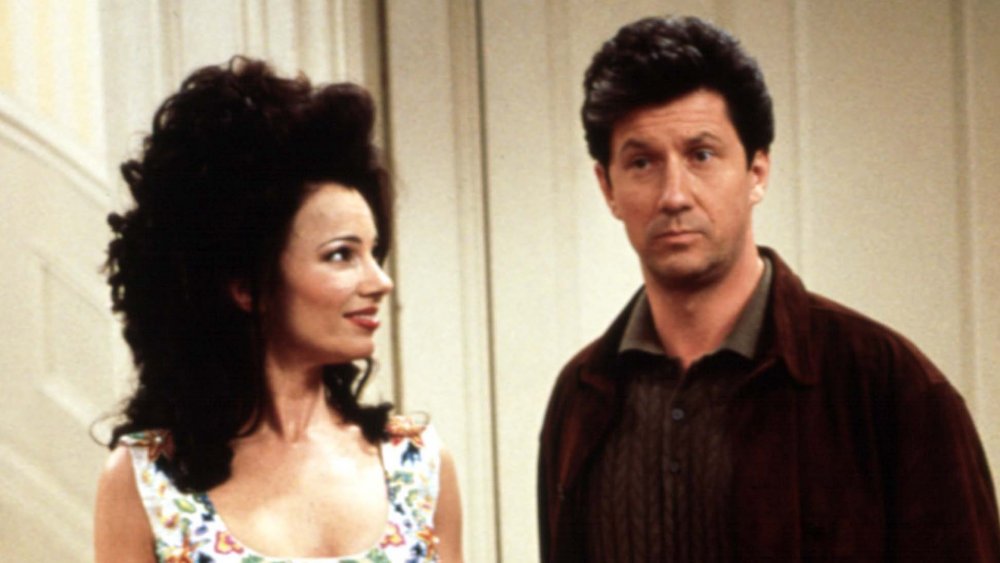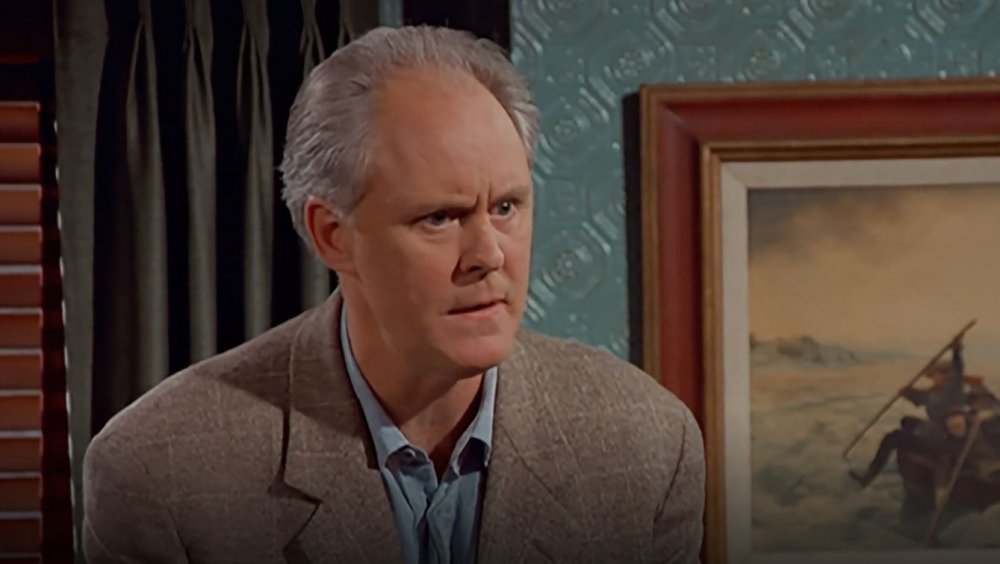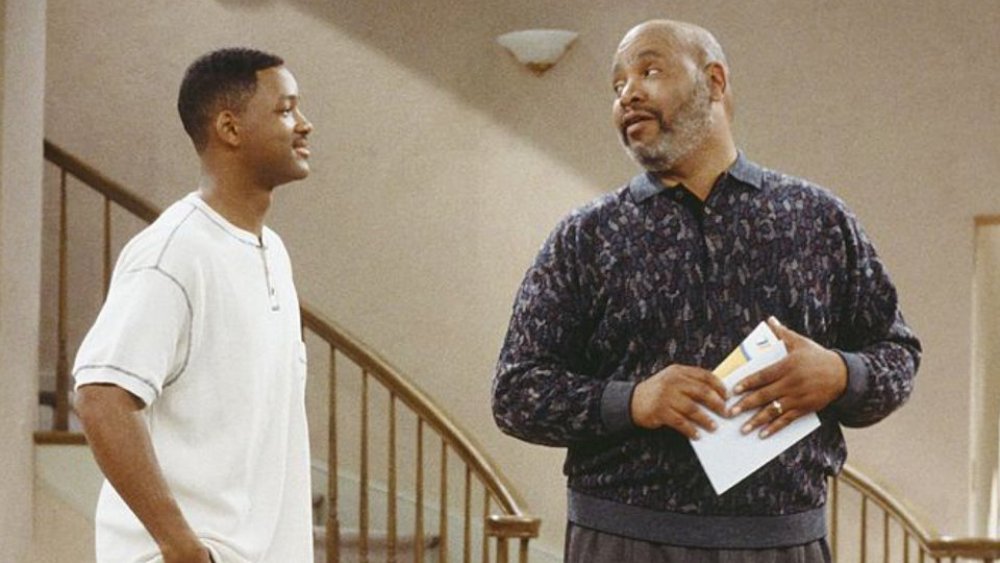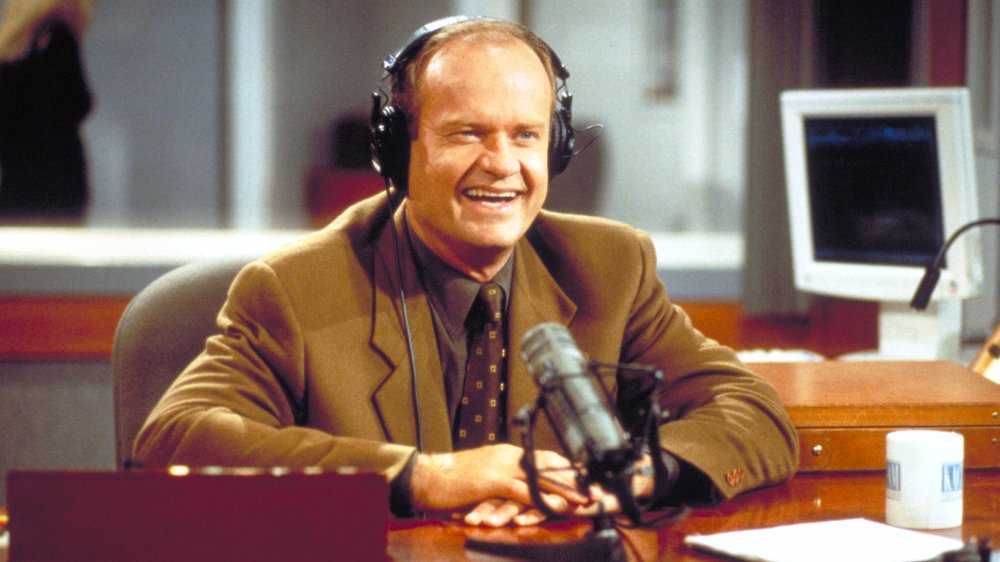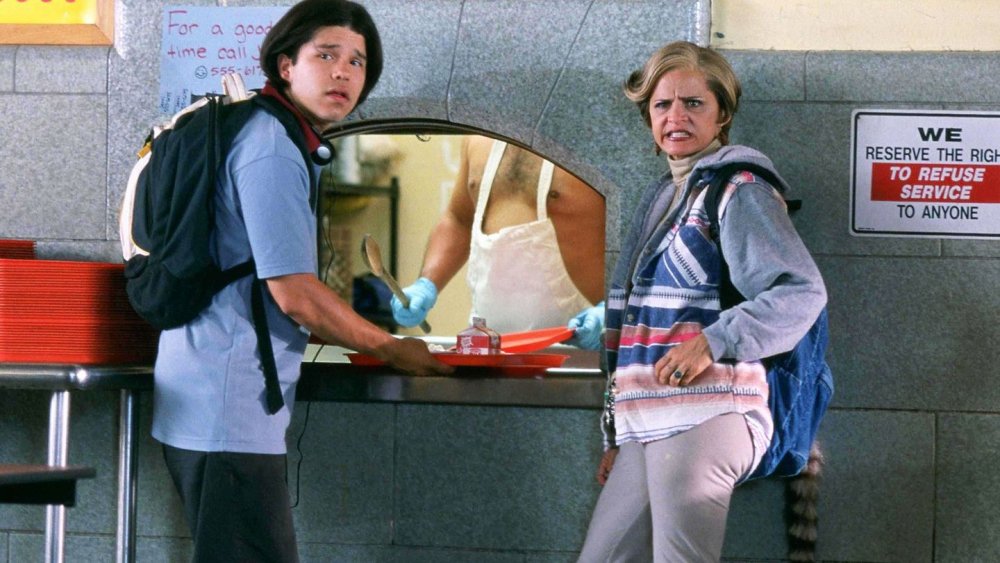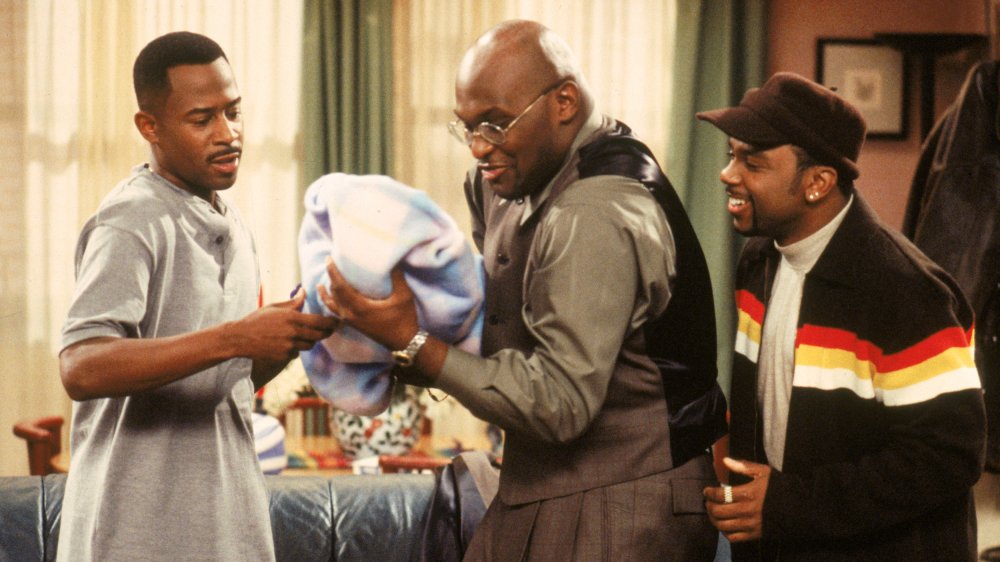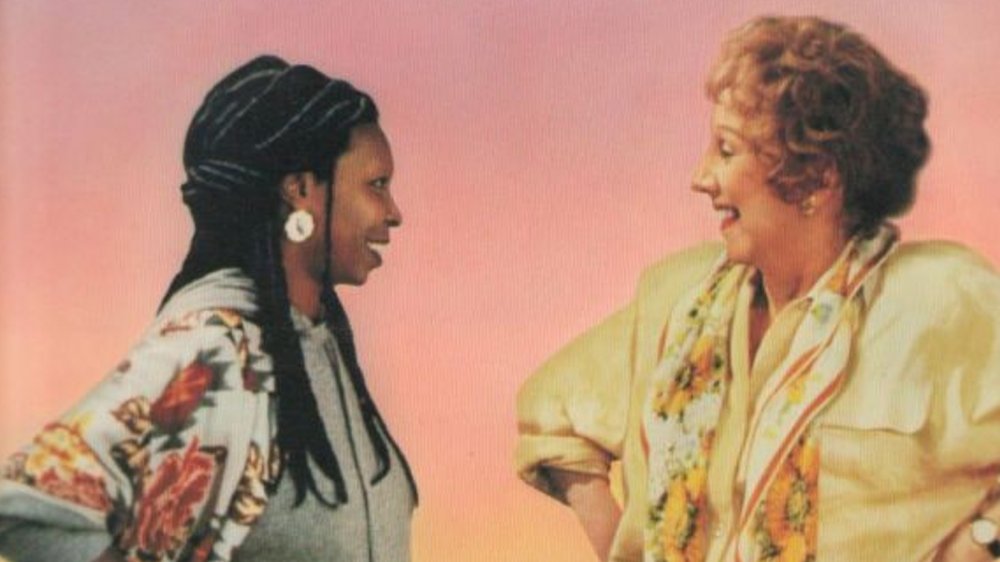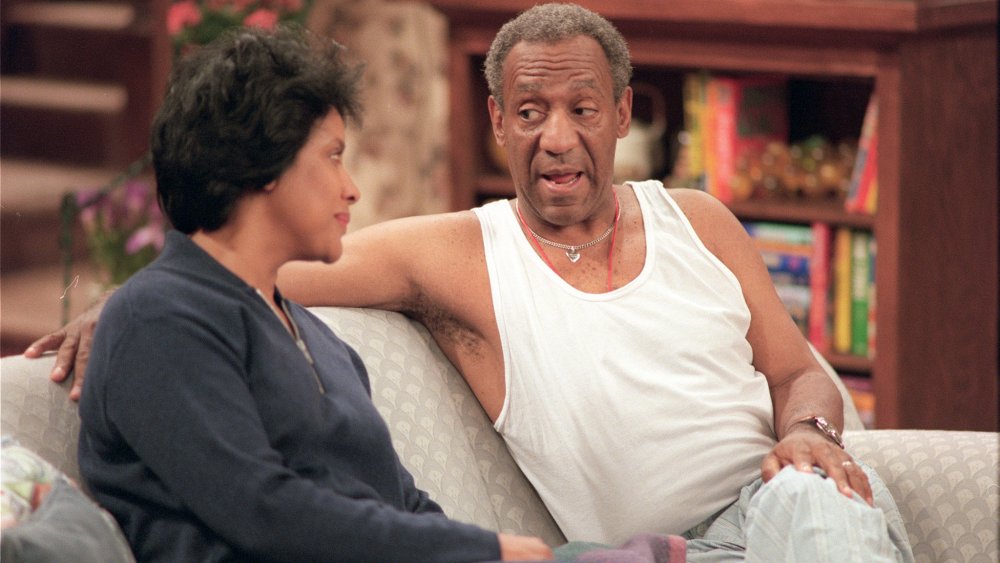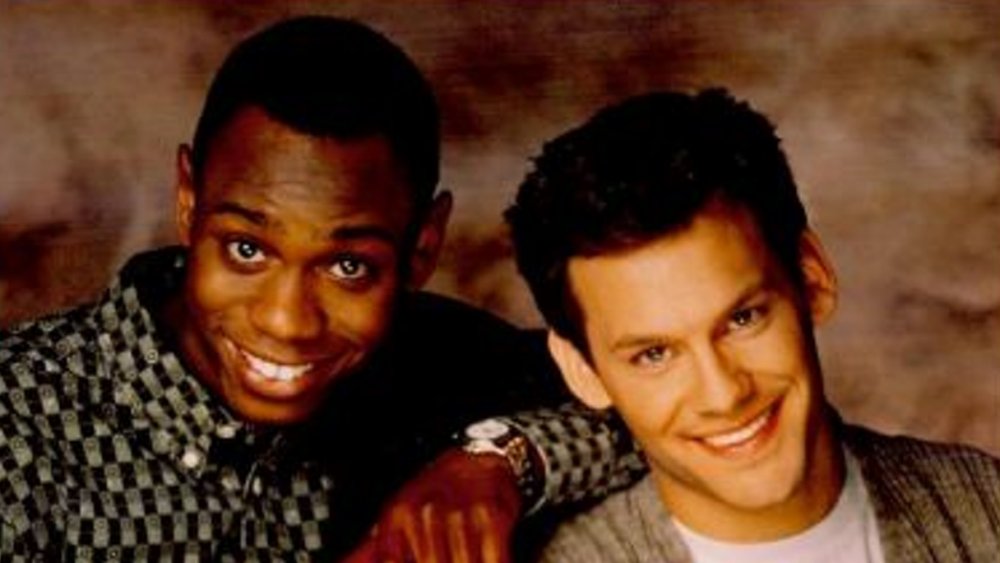These '90s Sitcoms Were Canceled And Here's Why
The 1990s brought a tidal wave of sitcoms crashing onto television's shores. Some lasted for years, some become iconic classics, and some just filled spots on the schedule between better shows. They were, in time, all canceled — except for the The Simpsons, which will run until the heat death of the universe. It's the nature of the TV jungle: Some days you're on top, some days you're dead and done.
Behind every cancellation is a story, but few know them in full. Information traveled slower back in the 1990s, if it traveled past its source at all. The reasons behind these series' cancellations are myriad, and the answer isn't always as simple as "bad ratings." Bad time slots, writer changes, and behind-the-scenes drama plagued many a production, no matter how beloved or well-watched. These the real reasons these 1990s sitcoms got canceled, understood at last with the sort of detail only hindsight can provide.
NewsRadio
NewsRadio was one of the most acclaimed sitcoms of the '90s, but all its good critical notice came in spite of — or, depending on one's perspective, because of — battles with the network.
Creator Phil Simms fought with NBC over everything from scheduling to plotlines. By his telling, NBC wanted more established stars. Though Dave Foley, Andy Dick, and Joe Rogan were all known names in comedy, they were not stars on par with, say, Brooke Shields.
Almost certain his show was getting canceled, Simms gave a profanity laced interview to Rolling Stone. He admonished NBC for not giving his show a slot in Thursday night's Must See TV lineup, and lambasted executives by name. After this, the show was briefly canceled before being brought back, which led to everyone awkwardly walking what they said back and playing nice.
Phil Hartman's murder before season five changed the dynamic of the show. Hartman was something of a big brother to the cast, and addressing his death resulted in an uncomfortable tonal shift. Jon Lovitz never quite clicked as his replacement either, making Hartman' absence all the more noticeable.
All of this was on top of Preston Beckman, NBC's head of scheduling, despising the show. During its run, it changed time slots 11 times. Between Hartman's death, the unstable time slot, and a network that never quite bought in, the show was canceled after its fifth season.
Veronica's Closet
Veronica's Closet, a show that follows protagonist Ronnie Chase as she runs her lingerie business and chases romance, was never a critical darling. It didn't matter — at least for a while. When a show on NBC is produced by the same team that made Friends, it has some sway.
Veronica's Closet was, in fact, given something even better than good reviews: A 9:30 PM time slot on NBC. This was an absolutely juicy slot to score, smack-dab in the middle of the Must See TV lineup. Veronica's Closet aired between Seinfeld and ER during its first season and between Frasier and ER during its second. Ratings were great during this time, until they started to taper off towards the end of the second season. Bad critical notice had caught up to it, and audiences were growing less and less interested.
NBC responded to this ratings dip by transferring the show, alongside Suddenly Susan, to Monday evenings. Some saw this as a way to dump shows that were under-performing. NBC had openly promised critics and fans that the show would improve, and even brought on new writers from Friends to help it out. Ultimately, none of this tinkering mattered — the unprotected time slot killed it. With no loyal following, the show cratered in the ratings before getting canceled.
Freaks & Geeks
Freaks & Geeks transcended its sitcom status, ultimately becoming one of the defining teen shows of the 1990s. Unfortunately, much of its reputation is posthumous — it was canceled after one season and never given another chance by NBC.
The show debuted at 8 PM on a Saturday — an awful time for a new show, especially one aimed at teens. The show suffered other schedule-related setbacks, including being spiked in favor of the MLB playoffs.
Freaks & Geeks then changed time slot, hampering any chance at accruing ratings. The producers created a website — a rarity at the time for TV shows – to help fans keep track of when it was on. But NBC refused to put the URL on any commercials, lest viewers gravitate towards the web instead of TV.
Additionally, there were tensions between the producers and the network. NBC wanted a more positive show, while the producers wanted to keep things realistic. Executive producer Judd Apatow became particularly known for viciously defending his show to any and all network executives. In the end, the show was canceled, but its legend has only grown.
Suddenly Susan
Suddenly Susan had a lot going for it: The support of a major network, a solid cast headlined by Brooke Shields, and one of the best time slots on TV. Season one aired on Thursday night at 9:30 PM, between Seinfeld and ER. Ratings took a steep drop after the show was moved to Monday, but still pulled good enough numbers.
The show faced many challenges around the end of the third season, however. Actor David Strickland, who played Todd, committed suicide, a major blow to the cast and crew. In the off-season, almost the entire creative team left — as did actor Judd Hirsch. He was replaced in the final season by Eric Idle, but it wasn't enough. Between an unfamiliar creative team and an unfavorable time slot, Suddenly Susan dropped in the ratings like a stone, and was canceled mid-season. The remaining episodes were burned off in the summer.
Sports Night
Sports Night, Aaron Sorkin's dramedy about the behind-the-scenes work of a sports show, was never a ratings success — but it almost didn't matter. It was critically acclaimed, picked up awards, and the viewers who watched were a passionate bunch. When fans got a sense that Sports Night wouldn't last, they set up websites petitioning to save it — a big deal in the late '90s.
When ABC axed the show, several other networks — USA, HBO, and Showtime — expressed interest. Negotiations with Showtime went furthest, with Sorkin claiming they offered him about $37 million dollars for two more seasons. Near-guaranteed money on a network where ratings didn't matter as much was a near-perfect scenario, but Sorkin had no choice but to turn it down.
Why? Because during Sports Night's second season, Sorkin created a little show called The West Wing for NBC. He did almost all of the writing for both shows, splitting his days between the two of them. Around this time, his wife was pregnant and Sorkin realized he couldn't give his all to Sports Night. Showtime didn't want to enter into a heavy commitment without Sorkin going all-in, so negotiations stopped. Sorkin was at least comfortable letting Sports Night go "with its head held high" instead of diluting it.
Home Improvement
Home Improvement was one of the most popular sitcoms of the '90s. It spent its entire eight season run in the Top 10 for ratings, and the series finale aired on a third of all televisions in America. So why was there never a ninth season? Because Tim Allen and Patricia Richardson each wanted to move on for their own reasons.
Richardson was offered $30 million for another season of the show. She turned it down because she decided to focus on her family — she was a single mother to three children, and Home Improvement was keeping her away from them too much. Luckily for fans, Richardson did eventually return to TV in shows like Strong Medicine and The West Wing.
Allen, meanwhile, was at his most bankable. During his run on Home Improvement, he had major box office hits with The Santa Clause, Toy Story, and the now forgotten but successful Jungle 2 Jungle. Hollywood was calling. Moreover, TV Guide indicated that even with an offer of $50 million for season five, he didn't want to do the show without Richardson.
Blossom
Long before she played a scientist with a PhD in neurobiology, Mayim Bialik was an average teenage girl on Blossom. One of the more popular family sitcoms of the early '90s, the show had a dedicated audience before ending after season five. It was canceled for three main reasons: The stars getting older, the audience aging out, and competition from Melrose Place.
That's the thing about shows focused on teenagers, be they characters or actors — they grow up. The final episode sees Blossom getting ready for college, and a life utterly unlike the one fans fell in love with. The primary audience for these shows is tween girls, and their tastes change and mature as they do. Shows like Blossom have a shelf life in this regard — especially when more mature shows like Melrose Place are around.
Blossom also went beyond Very Special Episodes — tackling touchy subjects became part of the show's DNA. While this kept it relevant, it could not save it entirely. Kids liked Blossom and took some very important lessons from it about assault, divorce, and addiction ... and then grew out of it.
Dinosaurs
Dinosaurs is, frankly, strange. In many ways, it's a normal sitcom about a suburban family dealing with everyday issues ... except for the fact that the entire cast are anthropomorphic dinosaurs portrayed by puppets. Somehow, it had some of the sharpest TV writing of its era, and was without question one of the most aesthetically interesting productions of the '90s.
The cost of the show's sophisticated puppetry ultimately made the show unsustainable, especially when ratings started to slip. Rumor spread that it was "the most expensive half-hour on television." Eventually the show just wasn't worth what it cost to make and ABC canceled it.
But the writers weren't interested in going gently into that good night. No — they decided to make one of the most bonkers finales in TV history. "Changing Nature" sees the cast try to handle an invasive plant species by accidentally setting off an ice age. The script prompted a call from ABC's president, asking where they got the chutzpah to kill off the entire cast. The writers responded that the source was the planet's actual history. In the words of series creator Michael Jacobs: "When you do a show about dinosaurs, you always have that extinction card in your pocket, and we wanted to use it."
Ellen
Ellen made television history with "The Puppy Episode," in which the titular main character played by Ellen DeGeneres comes out as gay. This also proved to be the beginning of the end for the show, as a combination of backlash and weird creative decisions caused ratings to plummet.
During Ellen's fourth season, DeGeneres and ABC were fighting about the content of the show. Network executives were reluctant to let Ellen come out, and started putting content warnings before shows. DeGeneres objected to this and threatened to walk before making a fifth season. Discussion post-"Puppy Episode" grew more and more complex: Chaz Bono, at the time the media director of GLAAD, worried the show was leaning in a little too much. "It's one thing to have a gay lead character," he said, "but it's another when every episode deals with pretty specific gay issues."
Eventually, Ellen was canceled after five seasons, but its history-making choices live on.
Phenom
Phenom, a sitcom about a tennis prodigy and her family, lasted one season and has largely been forgotten. All of this is despite the fact that the show had a lot going for it — a solid cast including Judith Light and William Devane, a theme song by Carly Simon, and James L. Brooks of The Simpsons and The Mary Tyler Moore Show fame producing it. Almost more importantly, it had a great time slot — it played on ABC between Full House and Roseanne. It even retained 95% of Full House's audience.
So why was it canceled? Depends on whether you ask ABC or the producers.
ABC implied it was canceled because it under-performed. "In the past," they claimed, "we have had the luxury of being patient and allowing a show a second year to see if it would pop in its time period. This season ... we were in a position to judge more strictly." Reviews indicated a lack of direction, but this was still a shock to fans.
Phenom creator and executive producer Dick Blasucci was also surprised the show was axed. He claimed that even though their own metrics showed good ratings, ABC told them that their numbers didn't match. Many saw this as code for a network looking for an excuse to cut a show.
Brooks himself, clearly angry, only had one statement: "I have no comment while I'm developing the muscle to lie about my reaction to what ABC did."
Grace Under Fire
Grace Under Fire was an early project by Chuck Lorre, and like many of his future shows, a ratings success. The titular Grace, a divorced mother and recovering alcoholic, is played by Brett Butler. The show soared on the wings of her talent ... and eventually struggled as her real-world problems intruded on set.
Butler's erratic behavior and drug addiction caused problems on and off during the show's run. The departure of two cast members and five executive producers are attributed to Butler's behavior. During a crossover event, production teams from other shows were so horrified that the crew for The Drew Carey Show got "I Survived Brett" t-shirts.
The show was also halted on at least two occasions for Butler to attend rehab. Both resulted in long delays, both added to her bad reputation, and both contributed to a ratings decline. Eventually ABC got fed up and pulled the plug on the show. Production never resumed. Butler now claims to be clean and sober and has expressed remorse for how she behaved, but it was too late to save Grace.
Salute Your Shorts
Salute Your Shorts was one of Nickelodeon's first big live action success stories. Following a group of kids at a summer camp, it was Nick's version of a sitcom for children — a genre that would grow enormously popular in later decades with shows like Hannah Montana and iCarly. It was a big success, producing two seasons within a calendar year on a shoestring budget. Production changes, however, forced a cancellation.
In June 1990, Nickelodeon Studios opened in Orlando, Florida. Nick intended to have all their programming shot there going forward. Salute Your Shorts had been recorded in Los Angeles up to that point, and struggled to adapt. The cast was primarily children and teenagers, who all decided that it wasn't worth it to up and move across the country. Hey Dude, one of Nick's other live action comedies, faced the same predicament. Ultimately, with nobody moving, both shows were canceled.
The Nanny
The Nanny was one of the most popular and pervasive sitcoms of the 1990s. Odds are that anyone reading this can hear Fran Drescher's laugh right now. Despite lasting six seasons, its cancellation came as something of a shock. Years later, Drescher attributed it to her character of Fran Fine finally acting on her sexual tension with Max Sheffield.
Will-they-won't-they storylines permeate many long-running sitcoms, and their culmination always changes the dynamic of a show. With the tension gone, viewers have less of a reason to tune in and writers have to come up with new storylines. Sam and Diane finally getting together meant Cheers had to struggle to find new sources of tension for the characters, and Drescher saw a similar problem on the horizon in her own show.
Drescher had no interest in having Fran pair up with Max, but was forced into the storyline after the network threatened cancellation. "When a show is built around a love that can't happen, sexual tension," said Drescher, "you have to keep it that way." She was right — ratings plummeted after the wedding, and the show was off the air a season later.
3rd Rock from the Sun
3rd Rock from the Sun followed a group of aliens masquerading as an upper middle-class American family, studying human habits and reporting back. It was, if you'll excuse the space pun, a far out show that dabbled in everything from witty wordplay to slapstick. It had a great cast, starring John Lithgow and Kristen Johnson, and introduced the world to Joseph Gordon-Levitt.
The show was off-kilter enough to have dedicated fans, but it had a hard time maintaining casual viewership. This wasn't necessarily the fault of the show — it's because NBC changed the timeslot 18 times over six seasons. The network didn't believe in 3rd Rock, in spite of its longevity. As such, the finale of season six was designed as a series finale, and the creative team signed on for different projects — correctly suspecting the show was done.
Cast members were uncharacteristically curt about their feelings towards the network. Gordon-Levitt called NBC's treatment of the show "disrespectful," saying that the network hadn't cared about them since the second season and "I'm ready to move on." Lithgow said the network "mishandled it badly," and that NBC never quite grasped what to do with them. Johnson said "all of us worked on the show as hard as we worked on not being bitter."
The Fresh Prince of Bel-Air
Will Smith's career from rapper to living with his auntie and uncle in Bel-Air to the world's biggest movie star is a strange arc. Starting as the Fresh Prince with DJ Jazzy Jeff in the 1980s, Smith got rich from his music — only to blow all his money on an unsustainable lifestyle. After getting in trouble with the IRS, he signed on to star in a sitcom largely because he needed the money.
Luckily for him, The Fresh Prince of Bel-Air went on to become one of the most memorable sitcoms of the '90s. Running the gamut on topics from normal teen issues to somber dives into racial discrimination, it was such a hit that it never left its 8PM Monday timeslot during its entire run. It ran six seasons for 148 episodes before ending, largely on Smith's own call.
By the end of the series, Smith had become a megastar. In addition to the leading role on Fresh Prince, he also had Six Degrees of Separation and Bad Boys under his belt. He was also set to star in a movie you may have heard of called Independence Day.
Smith loved his castmates but recognized the show was limiting and knew it was time to move on. He had something bigger in mind. "TV is a good workout facility," he said, "where you get to work on your timing and other paces, but I think I've had enough time in the gym. Now I'm ready for the coach to put me in the game... motion pictures."
Frasier
Few sitcoms come longer running and better-loved than Frasier. Starring Kelsey Grammer as radio psychiatrist Frasier Crane, the show went through almost the entirety of the '90s and beyond. Originally a spinoff of Cheers, Frasier stuck around a season longer than its predecessor. But why would such a long-running and successful sitcom get canceled? Part of it was a ratings dip, yes. But the larger part was unsustainable production costs.
Long-running shows often see higher production costs, given that actor salaries tend to rise and more care is put into the show itself. By the end of the final season, each episode of Frasier cost over $5 million to make, $1.6 million of which was Grammer's salary. He implied he'd be interested in a 12th season and might take a pay cut. An NBC spokeswoman stated that "the finances would not have worked for another season." The writers decided it was better to end the show on a high note than fight it as well.
Strangers with Candy
The story of "a boozer, a user, and a loser" going back to high school in her mid-40s, Strangers with Candy was one of the more bizarre and acclaimed comedy shows of the late '90s. Starring Amy Sedaris as Jeri Blank, based on eccentric criminal-turned-motivational speaker Florrie Fisher, and featuring comedy icons Stephen Colbert and Paul Dinello, the show was a hit on Comedy Central.
It ran for 30 episodes over three seasons in 1999 and 2000. Its weird twisted morals alone make for some of the best comedy of its era, even though it's mostly a cult hit. As such, Strangers with Candy often makes lists of shows that were canceled too soon.
Here's the catch, though — according to Sedaris, the show was technically never canceled.
In an interview with the Austin Chronicle promoting the film prequel of the same name released in 2006, Sedaris said, "They have never officially told us that the show has been cancelled. We kind of knew it." In that era, most Comedy Central shows only lasted three seasons, and the Strangers with Candy team operated under the assumption that they'd be no different. "We thought if we were going to do it again, yeah, we could write 10 episodes or not write 10 episodes. We were fine either way, but the last episode we wrote assuming that the show was going to get canceled, so that's why we went out with that." Given that all three primary creative principals have gone on to bigger and better things, don't expect a revival anytime soon.
Martin
Martin was one of the highest-rated sitcoms during Fox's rise in the early '90s. By the end of the show's run, it was still the third most-watched show among Black viewers. It was a hit however you slice it, and still does well in syndication. When it ended somewhat abruptly after five seasons, Lawrence claimed he felt it was "time to move on" and "take some time for myself and concentrate all my efforts on my film career." This sounded plausible enough at the time — he already had a huge hit in Bad Boys and wrote/directed/starred in A Thin Line Between Love and Hate.
Of course even in the pre-Twitter days, Lawrence was enough of a public problem that most people suspected differently. People Magazine said Lawrence was "updating the how-to manual on career immolation" after a string of erratic behavior. Most notably, co-star Tisha Campbell quit the series and hit Lawrence with a sexual harassment lawsuit. The suit was settled out of court and Campbell only returned on the condition that the two would not be on set together for the series finale.
Lawrence told GQ Magazine in January 2020 that he regretted a lot of his behavior in the '90s. He also openly acknowledged for the first time that he walked away from Martin because of the lawsuit, saying that "people said that I got canceled, but that wasn't the case. I decided to just leave the show." He and Campell are on good terms as of late, so there's at least a happy ending.
Bagdad Cafe
Based on the 1987 movie of the same name, Bagdad Cafe told the story of the two women running the titular restaurant/hotel out in the Mojave Desert. The show centered on the odd couple partnership of Whoopi Goldberg as the owner and Jean Stapleton — yes, Edith Bunker — as a woman who offers to help after leaving her husband. It ran for two seasons in all.
Whatever the show had going for it was no match for what went against it. Reviews on average praised the cast, but found the show unremarkable. It faced off against Family Matters in its timeslot, a tall order for any sitcom at the time no matter how acclaimed. The show's ratings dropped further during the second season, which many attributed to the Gulf War starting between seasons and giving people the heebie jeebies about the word Bagdad/Baghdad.
Perhaps the most damning issue was rumors that Goldberg — already one of the busiest women in Hollywood, who filmed The Long Walk Home during production — feuded with the producers behind the scenes. The newly released Ghost also kicked her movie career into a higher gear. In November of 1990, Goldberg called the network president of CBS and quit Bagdad Cafe. Insiders blamed her increasingly abrasive relationship with the creative team. With no time to recast, the show was canceled quicker than they could remove its listing from TV Guide. Goldberg signed a movie contract with Paramount days later.
Cosby
Cosby was Bill Cosby's last attempt to go back to the well in sitcom form. It starred Cosby as Hilton Lucas — a character notably not named "Cosby" on a show named Cosby — forced into early retirement. The show covers his daily life at home with his wife, played by Phylicia Rashad — yes, the same person who played Clair Huxtable on The Cosby Show. We're not joking about "going back to the well."
The show delivered decent ratings for CBS, even if it never scaled the heights The Cosby Show achieved. The plum 8PM Monday timeslot helped — in fact, when the show was moved to Wednesdays, ratings plummeted. Cosby was canceled toward the end of its fourth season. Even with the cancellation before the 100-episode mark, the network still spoke highly of all involved. Network chief Les Moonves in particular was effusive in his praise of Cosby — a vote of career confidence that, in light of Cosby's subsequent legal woes, has not aged terribly well.
Buddies
Let's get this right off the bat: Buddies was a bad idea for a show based on a bad premise with bad production choices. Based on characters Dave Chappelle and Jim Breuer played on an episode of Home Improvement, the show was summed up by Breuer as "he's a black guy and I'm a white guy and we're friends, duhhhhhhh!" In addition to the first fatal mistake of the thin and hackneyed plot, the second fatal mistake was the show not starring Breuer. Chappelle and Breuer had solid chemistry because they were real-life friends, but Breuer was replaced during rehearsals by Christopher Gartin. He and Chappelle never clicked.
The show never stood a chance and was canceled after only five episodes because of bad ratings, bad reviews, and bad content. Nothing particularly complicated here. The show is now mostly remembered for its short run and for being an early part for 22-year-old Chappelle. He still shows no affection for the show. When asked about Buddies in 2004, Chappelle said, "It was a bad show. It was bad. I mean when we were doing it, I could tell this was not gonna work."
